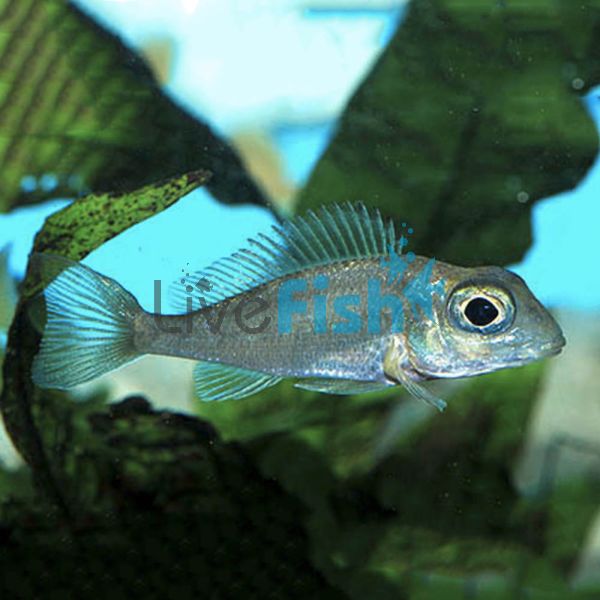Callochromis Macrops 5cm
The Callochromis Macrops or the big eye cichlid is quite possibly a fish that most aquarists have never heard however they are a beautiful African cichlid to keep and experience. Coming from lake Tanganyika this species closely resembles saltwater fish like wrasses and parrotfish in their anatomy which adds another level of coolness. They also stay relatively small maxing out at around 12 and are only semi-aggressive which makes them great to be kept in a species-only colony or in a larger Tanganyikan community system. The big eye cichlids would be a perfect breeding project for African cichlid enthusiasts or aquarists looking for a new project as well.
- Buy 2 for $64.66 each and save 10%
- Buy 4 for $57.47 each and save 20%
Callochromis Macrops
The Callochromis Macrops or the big eye cichlid is quite possibly a fish that most aquarists have never heard however they are a beautiful African cichlid to keep and experience. Coming from lake Tanganyika this species closely resembles saltwater fish like wrasses and parrotfish in their anatomy which adds another level of coolness. They also stay relatively small maxing out at around 12 and are only semi-aggressive which makes them great to be kept in a species-only colony or in a larger Tanganyikan community system. The big eye cichlids would be a perfect breeding project for African cichlid enthusiasts or aquarists looking for a new project as well.
Though the big eye cichlid is often referred to by its Latin name, it has developed an obvious common name. It gets this because of its unusually large eyes which stand out quite obviously against the fish. Since these cichlids spend a lot of their time near the bottom of the aquarium, their body shape reflects this with the near flat belly and curved back. As juveniles, this species is predominately silver however as the males mature, they can develop some beautiful shades of orange and bronze colours. The fins also carry an iridescent blue which makes for a simple but elegant contrast which can stand out even further in a well-put-together habitat. Females tend to have less vibrant colouration compared to the males but these fish for sure makeup for it in their rock-dwelling and bottom-dwelling behavior.
Breeding these fish is can be challenging but it is a very fun process. Surprisingly they tend to do most of the hard work where females will lay eggs which they then mouth brood once fertilized. The issue is that for the first few times, the inexperienced pair may predate on the eggs or simply not get the process correct. Since they can be semi-aggressive, there should also be a stable ratio of males to females. It is usually best to start off with a school of 6-10 fish and then aim to keep only 1-2 males and the rest can be females.
Tank Recommendations for your Callochromis Macrops
The environmental conditions of this species are quite important as they can really bring out a lot of the natural behaviors which are displayed by the Callochromis Macrops. It is best to have a tank that is at least 250 litres to ensure there is enough space for an adult colony since these fish should be kept in groups. The ideal aquascape would consist of a large sand bed with rock caves near the back of the tank. This best replicates the shallow, rocky outcrops that these cichlids inhabit in the wild. Since these cichlids are from lake Tanganyika, they do require a higher PH of 7.0 - 8.5, this can be easily achieved through African cichlid conditioning salts or using crushed coral in the tank as well. These are also tropical fish which are best kept at 24-26 degrees.
Suitable Tank Buddies
The Callochromis Macrops can be kept with other medium-sized African cichlids however it’s best to do so in larger tanks since this species can be territorial. Since these fish require a higher PH of around 8 the tank mates chosen should be adaptable to this.
Usually Compatible
Black Calvus, furcifer cichlids, Xenotilapia and julidochromis.
Sometimes Compatible
Frontosa, smaller Mbuna species, and other larger but somewhat peaceful African cichlids like Mdoka whitelips.
Rarely Compatible
Aggressive African cichlid species like fuscodichromis and polystigma.
Feeding your Callochromis Macrops
Callochromis Macrops will take to aquarium foods very easily. They will take a wide range of pellets, flakes, and frozen foods. Giving them a varied diet, ensures that they have optimal nutrition.
The ideal diet would be good quality, small and slow food, supplemented with green matter like algae flakes or sheets. Feeding any foods with natural colour enhancers would also be great as this will really enhance the oranges in this fish.
| Scientific Name | Callochromis macrops |
|---|---|
| Care Level | Moderate |
| Common Names | Callochromis Macrops, big eye cichlid |
| Diet | Omnivore |
| Fish Family | Cichlidae |
| Lifespan (years) | 7 |
| Max. Length (cm) | 12 |
| Min. Tank Volume (l) | 150 Liters |
| Origin | Africa |
| Reef Safe | No |
| Sociability | Peaceful |
| Venomous | No |
| Water Conditions | 24-26° C, pH 7.0-8.5 |




